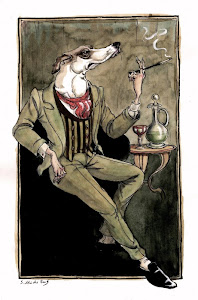 I admit it: I've used the semi-colon on more than one occasion. But apparently not frequently enough. It is now, according to an Australian newspaper, in danger of going extinct:
I admit it: I've used the semi-colon on more than one occasion. But apparently not frequently enough. It is now, according to an Australian newspaper, in danger of going extinct:For centuries, the semicolon has carved out a tenuous - but precious - place for itself between the comma and the colon.
Without the humble semicolon, some of the greatest achievements of English prose - the looping, qualified sentences of Henry James; the elaborate, ironic juxtapositions of Evelyn Waugh - would not have been possible. It has endured; it has persisted; it has even thrived.
But now - under the various pressures of texting, email, journalese, "plain English" and PowerPoint - the career of the semicolon appears rapidly to be approaching a full-stop.
The rare, and usually middle-aged [WTF?!], journalists who still revere the semicolon will discover it is no favourite of sub-editors, who will nowadays allow the comma to do much of the semi's previous work of co-ordinating ideas inside a sentence. And as sentences get shorter, there is less of that work to do.





















15 comments:
I was just in fact proofreading a document for my boss (not my job, but I was the only other person in the office late this afternoon) that's going up to our VP, and I did indeed tidy up some of his run on sentences with the help of this trusty punctuatory friend of ours.
The semi-colon exists for a reason.... Just as all punctuation has a purpose. That purpose is to clarify meaning, and at times convey tone of voice.
The semi-colon is a punctuation mark carrying more weight than a comma, but not the full-stop force of a period. In our daily speech we invariably use a slight pause or shift in vocal tone. And so it should indicated in written form. (Fuck text-message shortcuts anyway.)
Now if you were to talk about a semi-colonoscopy, I would be worried.
--JC
Quietly applauding JC's beautifully worded comment.
Both spelling and punctuation seem to escape me quite a lot of the time.
I know very well how to use the semicolon in the Swedish language, but I have to examine if there are any differences in use when it comes to the English language. Thanks for this post!
If you see semi-colons properly used in a piece of writing, it is more likely than not to be worth reading.
smicln!!! OMG LOLZ!!!
Admiral, What a beautifully timed piece - the decline in the structure and organisation in language as a metaphor for the collapse of Western Civilisation. Could we take it further and suggest the semi-colon represents the beleaguered middle classes?
I have to say that I still use the semi-colon on a regular basis (maybe too much) and am sure it shall never be forgotten!
Schopenhauer for example was a great an avid user of the semi-colon.
Why should the semi-colon escape the forces of dumbing-down now at work throughout our culture? This semi-colon must think that it's a special character . . .
I despise the semi-colon because it is such an ugly and ungraceful mark. Death to the semi-colon. We can make do with well enough with commas, dashes, and periods, thank you.
semi-colon's have their uses ;-)
Recently read an article about eliminating the use of the oxford comma, which lead to discussion of not having two spaces after a "period". Now potentially no Semi-colon? What's this world coming too? And what will my kids use to convey light-heartedness in their emoticons if the semi-colon is eliminated from the key board?
Greetings from Sydney, Australia; greatly enjoying your splendid blog which I have just discovered;also relishing your praise of the semi-colon[e e cummings would be lost without it];maintain the rage.
I too am an avid and instinctive user of the semi-colon. It is the most elegant of punctuatory devices. I would be lost without it and cannot understand how any piece of decent writing could be devoid of it. It allows for a change of tone or elaboration of a point or idea in the most natural flowing style. The staccato effect of the full stop and the pedestrain comma will never do.
I have just discovered this blog and am awfully glad I have! I feel very much at home.
Post a Comment